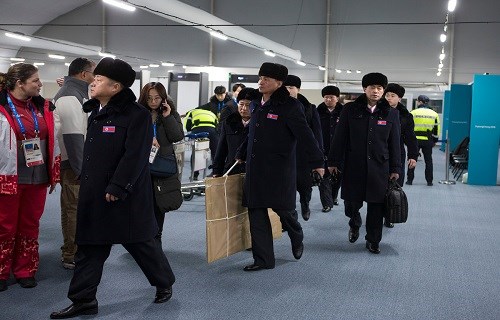The curious case of North Korea’s participation in the Paralympic Games
On March 7, a North Korean delegation including six athletes and 18 officials crossed the border to participate in the 2018 Paralympic Winter Games in Pyeongchang, South Korea. It is the first time the country is participating at a Winter Paralympics.
“Hello, our beloved compatriots and people with disabilities in the south,” greeted Kim Mun-chol, who leads the Central Committee of the Korean Federation for the protection of the disabled, to South Korea upon the arrival of the North Korean delegation.
“I deliver a warm compatriots’ greeting from our people and people with impairments,” said Mun-chol, according to Inside the Games.
North Korea has sent six athletes, however, only two will compete – skiers Kim Jong-hyon and Ma Yu-chol. Athletes from the north and the south marched under a unified flag during the opening ceremony of the Winter Olympics last month. However, it was decided that the two countries will not be marching together at the opening of the Winter Paralympics.
The North’s participation in the Winter Olympic and Paralympic Games has received high praises and has, inter alia, been hailed as a “catalyst for building peace” on the Korean peninsula.
Yet, North Korea’s participation in the Winter Paralympics may seem surprising given its long history of human rights abuses and reports that disabled people are discriminated against and, in some cases, imprisoned.
Improving rights for disabled people
With respect to human rights, the North Korean regime maintains one of the worst track records of any country in the world. There is no right to free speech, and the state holds a tight grip on radio, television, music and news providers. According to reports from Amnesty International, nearly 200,000 prisoners are incarcerated in labour camps for political crimes and subjected to physical abuse as well as executions.
However, the issue of disability rights offers a recent exception to the gloomy track record on human rights violations. Since the late 90’s, North Korea has changed its conduct towards the rights of disabled people in three ways.
Firstly, it has increased cooperation with the United Nations (UN) to shape its policies to fit international standards. Secondly, the government has allowed the forming of civil society groups focused on disability rights, and thirdly, it has allowed more contact between its disabled citizens and the outside world.
Last year, for the first time, North Korea allowed an independent expert assigned by the UN Human Rights Council to visit the country. In her report to the UN, Special Rapporteur on the rights of person with disabilities, Catalina Devandas-Aguilar, commended the positive steps taken to improve disability rights, but expressed that “there is still a long way to go”.
Disability rights – a “winning issue”
Why does the North Korean government treat disability rights differently than other human rights issues? According to former United States special envoy for the issue of human rights in North Korea, Robert King, the answer may be that disability rights does not impose a threat to the regime.
“First of all, progress on the disability issue is not a threat to the regime. It’s not like freedom of speech or access to television from South Korea. It’s not going to undermine the claims of legitimacy of the government,” King points out, as reported by Business Standard News.
Greg Scarlatoiu, Executive Director of the Committee for Human Rights in North Korea, argues that North Korea’s willingness to progress on disability rights may be an attempt by the government to improve its image towards the international society.
“I’ve spoken with many UN officials, and I don’t think anyone is under any illusion of a dramatic sea change in North Korean human rights,” Scarlatoiu explained in an interview with Business Standard News.
“The terrible things done to political prisoners in the camps, the utter lack of freedom of expression, freedom of association, any conceivable human right. But in this case, they selected disability rights as a point of contact where they can make some cosmetic changes and get away with it—or who knows, perhaps go a little deeper and make some serious changes and see where it takes them,” he added.
In any case, participation in the Winter Olympics last month, and the Winter Paralympics this month, provides an excellent platform for the regime to project a positive image abroad while continuing to violate human rights at home.
The IOC and IPC remains silent
Although a number of experts and human rights advocates have called for a ban of North Korea from the Olympic Games, the International Olympic Committee (IOC) and the International Paralympic Committee (IPC) have remained silent on the issue.
“The International Olympic Committee should bar North Korea from participating in future Games. History has shown how effective such a strategy can be, and we can learn much from the example of how the world alienated the apartheid regime to make a moral statement about its appalling policies. It is unacceptable for the North Korean dictatorship to be able to freely compete alongside free nations such as South Korea and Japan,” asserts Garry Kasparov, chairman of the US-based Human Rights Foundation and former chess world champion, in the Washington Post.
Last month, David Maxwell, Associate Director of the Center for Security Studies at Georgetown University, explained in an interview with CNN that North Korea is getting legitimacy and recognition “without giving anything up”.
“It's pretty brilliant, and if it wasn't Kim Jong-un and North Korea you'd have to admire what they're doing, it's pretty amazing,” Maxwell said.
“The North is masterful at getting something for nothing,” he added.






